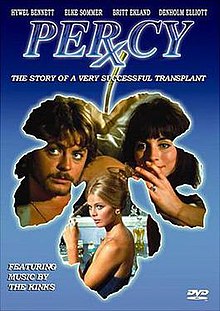
The oldest known surviving film was shot in the United Kingdom as well as early colour films. While film production reached an all-time high in 1936, the "golden age" of British cinema is usually thought to have occurred in the 1940s, during which the directors David Lean, Michael Powell, and Carol Reed produced their most critically acclaimed works. Many British actors have accrued critical success and worldwide recognition, such as Audrey Hepburn, Olivia de Havilland, Vivien Leigh, Glynis Johns, Maggie Smith, Laurence Olivier, Michael Caine, Sean Connery, Ian Mckellen, Joan Collins, Judi Dench, Julie Andrews, Daniel Day-Lewis, Gary Oldman, Emma Thompson, Anthony Hopkins and Kate Winslet. Some of the films with the largest ever box office returns have been made in the United Kingdom, including the fourth and fifth highest-grossing film franchises.

The Tales of Beatrix Potter is a 1971 ballet film based on the children's stories of English author and illustrator Beatrix Potter. The film was directed by Reginald Mills, choreographed by Sir Frederick Ashton, and featured dancers from The Royal Ballet. The musical score was arranged by John Lanchbery from various sources, such as the operas of Michael Balfe and of Sir Arthur Sullivan, and performed by the Orchestra of the Royal Opera House conducted by Lanchbery. It was produced by Richard Goodwin with John Brabourne as executive producer. The stories were adapted by Goodwin and his wife designer Christine Edzard.

Hywel Thomas Bennett was a Welsh film and television actor. He had a lead role in The Family Way (1966) and played the titular "thinking man's layabout" James Shelley in the television sitcom Shelley (1979–1992).
Canal+ Image International was a British-French film, television, animation studio and distributor. A former subsidiary of the EMI conglomerate, the corporate name was not used throughout the entire period of EMI's involvement in the film industry, from 1969 to 1986, but the company's brief connection with Metro-Goldwyn-Mayer and Anglo-EMI, the division under Nat Cohen, and the later company as part of the Thorn EMI conglomerate are outlined here.
Edward Small was an American film producer from the late 1920s through 1970, who was enormously prolific over a 50-year career. He is best known for the movies The Count of Monte Cristo (1934), The Man in the Iron Mask (1939), The Corsican Brothers (1941), Brewster's Millions (1945), Raw Deal (1948), Black Magic (1949), Witness for the Prosecution (1957) and Solomon and Sheba (1959).
Nat Cohen was a British film producer and executive. For over four decades he was one of the most significant figures in the British film industry, particularly in his capacity as head of Anglo-Amalgamated and EMI Films; he helped finance the first Carry On movies and early work of filmmakers such as Ken Loach, John Schlesinger, Alan Parker and David Puttnam. In the early 1970s while head of EMI Films he was called the most powerful man in the British film industry. He's been called "an unsung giant of British film who never got his due from the establishment in part because of anti-Semitism... the ability to be a successful studio head is very rare and most only last a few years. Cohen did it successfully at various companies for over two decades."
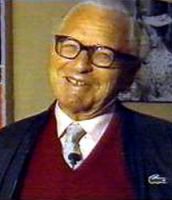
Ralph Philip Thomas MC was an English film director. He is perhaps best remembered for directing the Doctor series of films.
Sex comedy, erotic comedy or more broadly sexual comedy is a genre in which comedy is motivated by sexual situations and love affairs. Although "sex comedy" is primarily a description of dramatic forms such as theatre and film, literary works such as those of Ovid and Geoffrey Chaucer may be considered sex comedies.

The Go-Between is a 1971 British historical drama film directed by Joseph Losey. Its screenplay by Harold Pinter is an adaptation of the 1953 novel The Go-Between by L. P. Hartley. The film stars Julie Christie, Alan Bates, Margaret Leighton, Michael Redgrave and Dominic Guard. It won the Palme d'Or at the 1971 Cannes Film Festival.
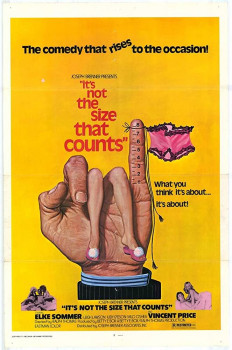
Percy's Progress is a 1974 British comedy film directed by Ralph Thomas and starring Leigh Lawson, Elke Sommer, Denholm Elliott, Judy Geeson and Harry H. Corbett. It was written by Sid Colin, Harry H. Corbett and Ian La Frenais. The film is a sequel to Percy (1971).

The Railway Children is a 1970 British family drama film based on the 1906 novel of the same name by E. Nesbit. The film was directed by Lionel Jeffries and stars Dinah Sheridan, Jenny Agutter, Sally Thomsett, Gary Warren and Bernard Cribbins in leading roles. The film was released to cinemas in the United Kingdom on 21 December 1970.
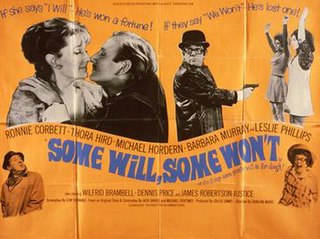
Some Will, Some Won't is a 1970 British comedy film directed by Duncan Wood, starring an ensemble British cast including Michael Hordern, Ronnie Corbett, Dennis Price, Leslie Phillips and Arthur Lowe. It is a remake of Laughter in Paradise (1951).

Up Pompeii is a 1971 British sex comedy film directed by Bob Kellett and starring Frankie Howerd and Michael Hordern. It was written by Sid Colin based on an idea by Talbot Rothwell.
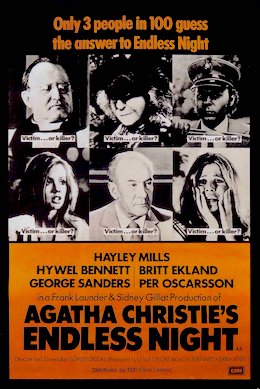
Endless Night is a 1972 British horror-mystery film directed by Sidney Gilliat and starring Hayley Mills, Britt Ekland, Per Oscarsson, Hywel Bennett, and George Sanders. Based on the 1967 novel Endless Night by Agatha Christie, the plot follows a newlywed couple who feel threatened after building their dream home on cursed land.

Eyewitness is a 1970 British thriller film directed by John Hough and starring Mark Lester, Susan George and Lionel Jeffries. Its plot follows a young English boy who, while staying with his grandfather and adult sister in Malta, witnesses a political assassination, and is subsequently pursued by the killers—however, due to his habitual lying, those around him are hesitant to believe his claims. It is an adaptation of the novel by Mark Hebden, the pen name for John Harris, and bears similarity to Cornell Woolrich's novelette "The Boy Cried Murder", originally adapted for film as The Window.
The Body is a 1970 British scientific documentary film directed and produced by Roy Battersby. In the film, external and internal cameras are used to showcase the human body.
Hollywood and the United Kingdom are connected via the American industry's use of British source material, an exchange of talent, and Hollywood's financial investment in British facilities and productions. The American studios have had their own bases in the UK in the past, such as MGM-British, and Warner Bros. owned shares in the now long disestablished British distributor Warner-Pathé, once part of the Associated British Pictures Corporation. The U.K. has had major production studios in the United States such as Trilith Studios.
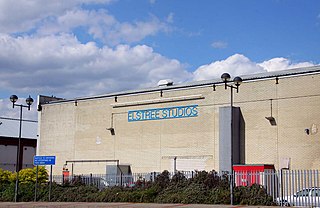
Elstree Studios on Shenley Road, Borehamwood, Hertfordshire is a British film and television production centre operated by Elstree Film Studios Limited. One of several facilities historically referred to as Elstree Studios, the Shenley Road studios originally opened in 1925.

Percy is a 1969 comedy novel by the British writer Raymond Hitchcock. It recounts the story of a British man who has the world's first penis transplant, following an accident.

Spring and Port Wine is a 1970 British film based on the play of the same name.
